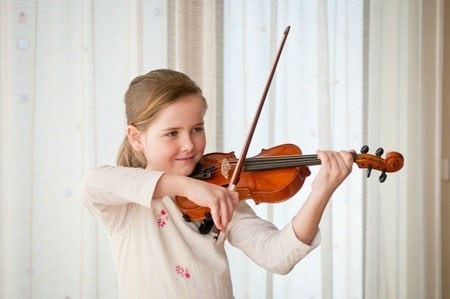Six benefits if children learn to play a musical instrument
Learning to play a musical instrument can help children improve their academic performance, enhance their social skills, and gain cross-cultural understanding.
Learning music or playing an instrument won’t make your child the next Beethoven, but it will help them learn math better, be better behaved, or be more patient. If you’re still wondering whether or not to enroll your child in a music class, here are some of the benefits:
1. Improve study skills
Lynn Kleiner, founder of a music education center in Redondo Beach, California, says music and math are closely linked. By understanding beat, rhythm, or melody, children also learn how to divide, create fractions, and recognize patterns. It seems that music is the brain's connection, helping children understand areas of math better.
Mary Larew, a violin teacher in New Haven (Connecticut, USA) said that as children grow up, they begin to learn and memorize songs. This helps awaken their short-term memory and gradually turns into long-term memory. This is good for other memory skills.
Instrument classes also introduce children to basic physics, for example playing the guitar or violin teaches about harmony and vibration. Even non-stringed instruments like drums give children the opportunity to explore these scientific principles.
|
Learning to play a musical instrument brings many benefits to children. Photo:CMUSE |
2. Develop physical skills
Some percussion instruments help children develop coordination and motor skills. They require movements of the hands, arms, and feet. “This is a great instrument for high-energy kids,” says Kristen Regester, Community Music School director at Columbia College Chicago.
Instruments like the violin or piano require movements from both hands, which requires children to improve their coordination skills to perfection. Therefore, practicing a musical instrument for a long time also helps children easily approach activities that require coordination and movement such as dance or sports.
3. Nurture social skills
Music classes are group-based and require children to interact and communicate with their peers. This encourages teamwork. If a child is playing an instrument and making sounds that are too loud and too fast compared to the rest, they will need to adjust themselves, thereby learning and understanding their individual roles and responsibilities within a group.
When playing music in a group, children, regardless of what instrument they play, must interact as a group, solve problems to achieve a common goal of creating good music. This is a skill and experience needed in society.
4. Be more disciplined and patient
Before they can make their first sound, they have to learn how to hold the instrument, how to place it on their feet, how to position their hands. So learning to play an instrument teaches children perseverance. They will understand that it takes hours, months, and even years of practice to achieve a specific goal, such as performing with a band or memorizing a solo piece.
While private lessons and home practice require attention, group lessons, where children must play their instruments in harmony, also improve patience as they have to wait their turn. To do this, children must listen to the other children's parts, thereby learning to respect their peers, sit quietly for a certain period of time and concentrate.
 |
5. Increase confidence and self-esteem
By playing an instrument in a group, children can learn to accept and give constructive criticism. Turning negative feedback into positive change helps build self-confidence. Group lessons, in particular, can help children understand that no one is perfect and that everyone needs to improve.
Performing in public is an important skill whether or not your child becomes a professional musician. It also helps improve your child's public speaking skills.
6. Understanding of multiple cultures
By learning about and playing a variety of musical instruments, children can discover how important music is in other cultures, for example, they will learn which country the guitar or violin originated from, what occasions it is commonly used for, and what type of music, and in what country it originated...
It is important that when children understand many cultures, they will have an open mind to the world and a desire to reach out to the world.



